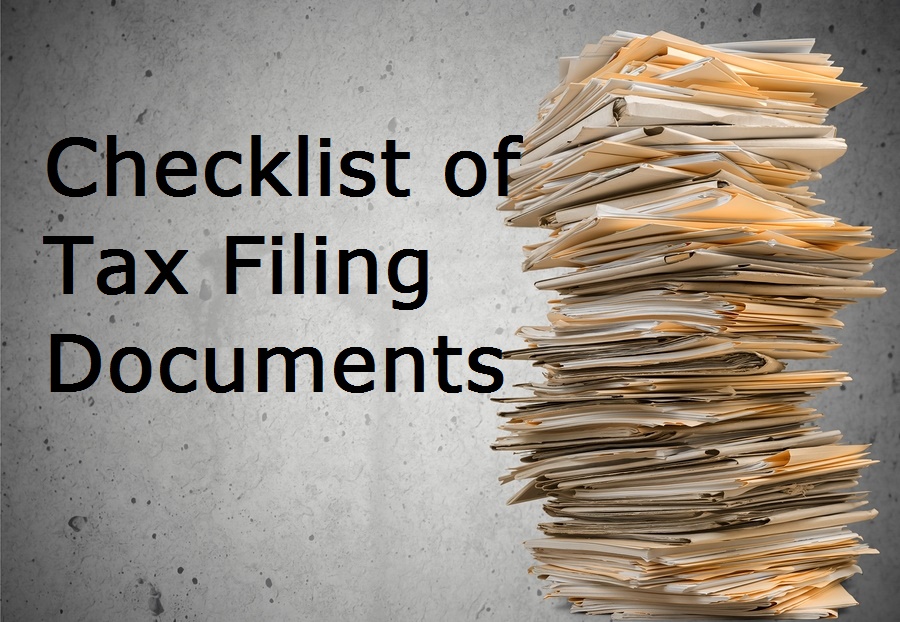5 Essential Documents Needed When Filing Taxes

When it comes time to file your taxes, having all the necessary documents in hand is crucial for an accurate and stress-free process. Filing taxes can be daunting, but with preparation and the right documents, you can significantly simplify the task. Here are five essential documents you'll need to gather before you dive into tax season:
1. Personal Information

Before delving into the financials, ensure you have the correct personal details for you and any family members you include on your tax return. This includes:
- Social Security Numbers (SSNs) for you, your spouse, and any dependents.
- Identification Numbers for immigrants or non-citizens.
- Adoption Taxpayer Identification Numbers if you’ve adopted a child.
💡 Note: Make sure all numbers are correct to avoid processing delays with the IRS.
2. Income Statements

Income statements are vital because they reflect the money you’ve earned in the previous year, which is the basis for calculating your tax liability. Here’s what you’ll need:
- Form W-2 from each employer detailing your salary, wages, and withholding taxes.
- Form 1099-NEC for any freelance or contract work, also known as nonemployee compensation.
- Form 1099-INT for interest income from banks, investment accounts, etc.
- Form 1099-DIV for dividend income.
- Form SSA-1099 if you received Social Security benefits.
- Form 1099-G for unemployment compensation.
- Any other 1099 forms relevant to your income sources.
🚨 Note: Keep track of all income sources, including digital payment platforms like Venmo or PayPal, which might require a 1099-K for certain business transactions.
3. Deduction and Credit Information

With the right documentation, you can reduce your taxable income through deductions or claim tax credits:
- Medical Expenses: Receipts or bills for any uninsured medical expenses.
- Education Expenses: Forms like 1098-E for student loan interest or 1098-T for tuition payments.
- Charitable Donations: Proof of donations to qualify for deductions.
- Home Mortgage Interest: Form 1098 to show interest paid on your mortgage.
- Child and Dependent Care Expenses: You’ll need to keep records of payments and who you paid.
✏️ Note: Itemizing deductions might reduce your taxable income more than the standard deduction, but you need to have records to back up your claims.
4. Health Insurance Documentation

Due to the Affordable Care Act, you’ll need to provide evidence of your health insurance coverage:
- Form 1095-A if you’re covered by the Health Insurance Marketplace.
- Form 1095-B or 1095-C from insurers or employers.
👩⚕️ Note: While the individual mandate penalty is now $0, these forms are still important for tax filing if you’re claiming a premium tax credit or an exemption from the shared responsibility payment.
5. Tax Payments and Withholdings

To avoid any surprises from the IRS or owing unexpected taxes, gather:
- Estimated Tax Payments made throughout the year.
- Any federal and state tax payments you’ve made outside of withholdings, like extension payments.
These documents ensure you’re credited for all payments made, reducing your tax liability or increasing your refund.
Having these documents in order not only streamlines the tax filing process but also ensures you're able to take advantage of every deduction and credit available to you, potentially saving you significant money.
The annual tax filing can be viewed as a checklist review, ensuring your financial life is in order. From personal information to income sources, deductions, insurance documentation, and payments, being thorough and organized when preparing these documents is crucial. Not only does it prevent delays, but it also gives you peace of mind, knowing you've addressed all aspects of your tax situation. In essence, proper documentation is key to making the tax season less intimidating, ensuring accuracy, and potentially saving you money.
What happens if I miss one of these documents when filing taxes?

+
If you miss a document, your tax return might be inaccurate. You could face delays in processing, owe additional taxes, or receive a smaller refund than expected. Always ensure you’ve gathered all necessary documents before filing.
Can I file taxes if I’m missing some income statements?

+
It’s best to wait until you have all your income statements. However, you can use available records to estimate your income, file an extension, and amend your return later when you receive the missing documents.
How do I know if I should itemize my deductions or take the standard deduction?

+
If your itemized deductions (like mortgage interest, charitable contributions, etc.) exceed the standard deduction for your filing status, it’s usually more beneficial to itemize. Otherwise, taking the standard deduction simplifies your filing.



